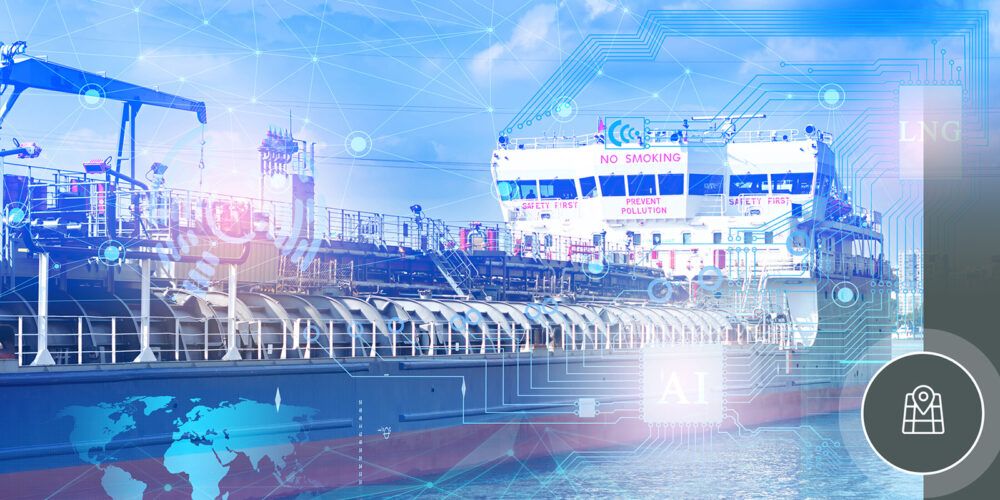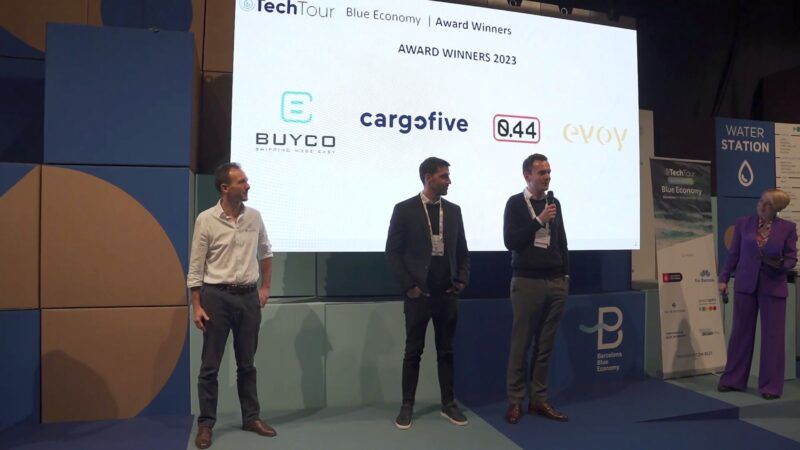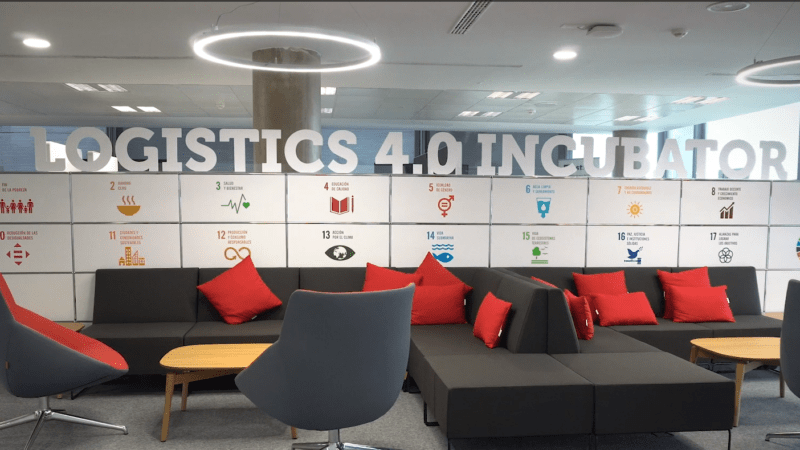 The objective of the nine selected projects is that they contribute to solving challenges that the port sector faces today and the challenges to come. (PierNext / GettyImages)
The objective of the nine selected projects is that they contribute to solving challenges that the port sector faces today and the challenges to come. (PierNext / GettyImages)
Ports 4.0: the nine winning commercial projects
The results of the first call for the “Ports 4.0” fund have been announced. Launched in mid-2020 to promote open innovation and attract, support and facilitate the application of talent and entrepreneurship to the Spanish logistics-port sector, the nine selected commercial projects address technologies such as artificial intelligence, sensorization, wave power, drones, information and communication technology, and passive cooling.

Alba González is Innovation Projects Technician at the Port de Barcelona.
 The objective of the nine selected projects is that they contribute to solving challenges that the port sector faces today and the challenges to come. (PierNext / GettyImages)
The objective of the nine selected projects is that they contribute to solving challenges that the port sector faces today and the challenges to come. (PierNext / GettyImages)
Resolution of the Ports 4.0 Fund
Last April 33 of the 156 ideas admitted in this modality were approved, each of which was awarded a fixed fund of 15,000 euros. The Ports 4.0 fund is financed through the Inter-port Compensation Fund, with an additional annual contribution of 1% from the port authorities for actions and research, development and innovation programs interesting for ports.
Now it has been the turn of commercial projects. At the beginning of June, the provisional resolution of the aid granted during the first call for this modality was published, granting about 4 million euros to 9 projects that intend to contribute to the 4.0 economy.
Projects in the commercial phase are those that have a level of technological development equal to or greater than TRL7 (prototype demonstration in a real environment) and the grant awarded must help to transform it into a product or service capable of being marketed, both nationally and internationally.
Of the 79 projects initially presented, the committee has evaluated 65 that promote solutions in areas of the port-logistics community such as logistics efficiency, environmental sustainability and energy, and security and protection.
The 9 selected projects address technologies such as artificial intelligence, sensorization, wave energy, drones, information and communication technology, and passive cooling.

Funded projects
These are the subsidized commercial projects:
- CLEVER VOLUME: Presented by the startup 3D Modelling Studio, Clever-Volume is a technological solution capable of measuring the waste that ships deliver to ports automatically, remotely and in real time, through sensors. It achieves this through the creation of a digital twin and remote software that measures the volume of waste and segments the data.
- TRANSPORTATION WITH DRONES IN PORT LOGISTICS OPERATIONS: Airmedia 360 presents a service for the transport of light goods (15 kg) through drones for logistics-port operations in the ports’ area. The objective is to develop a freight transport business model that allows packages to be transported from land to ships in an optimal and efficient way using an autonomous drone.
- PLANT-WEC: The company Vifemar Construcciones y Sistemas develops a wave energy generation system to produce electricity. This system also makes it possible to store hydraulic energy in the same structure without having to change the energy format. The idea is that it allows the implantation of the system on a large scale and with high levels of durability in the marine environment.
- SMARTecoREEFER: Presented by Inprous, they are high-performance passive cold intermodal containers for transporting perishable products that allow agri-food products to be exported to new markets optimally at an ecological and logistical level. This solution is comprehensive and guarantees the preservation of products for 20-25 days, thus reducing quality loss during transport and increasing competitiveness.
- PARVAMAP 3D: Software that maps in real time the status of the material stacks in warehouses and also automates the process of collecting and stacking solid bulks. The objective of the project is to achieve the complete automation of the storage parks, allowing the installation of remote operations. This project has been presented by PHB Weserhutte.
- Posidonia Port CDM: Prodevelop develops a system that optimizes the operations of all maritime agents involved in the port calls by exchanging information on operations in real time. The system makes it possible to obtain operation indicators based on the monitoring of the various events recorded by the platform, with the aim of improving the efficiency and sustainability of the ports, and helping to reduce emissions.
- GUARDIAN IIOT: Sibre España proposes a project that aims to commercialize an ecosystem of technological solutions to prevent container snags at the time of stowage, stopping the operation as soon as these are detected. Thus, a significant improvement is achieved mainly in terms of safety and efficiency in the operation of the terminals.
- PAULA: ‘Platform for Automatically Linking Agents’ is the deployment of a PortCDM-type technological platform that optimizes operations and improves the efficiency of port calls through digital information shared between the different agents involved. The system allows communication between ports so that they can send the actual departure time of ships to the next port of destination. This project has been presented by the company SeaPort Solutions.
- GUIDE ME: It is a platform that uses GPS technology, artificial intelligence and data analytics to propose hyper-personalized itineraries to its users in a fully automatic way. These itineraries are adjusted to the needs of the cruise passengers, taking into account the stopover time, the category of the cruise ship and the characteristics of traffic and the city. The objective of this digital solution is to optimize the flow of passengers in ports and cities.
Projects in the commercial phase are those that have a level of technological development equal to or greater than a TRL7
Support from Spanish ports
Various Spanish Port Authorities have supported these projects with the intention of promoting entrepreneurship and innovation in the Spanish port-logistics sector.
The pilot tests will be carried out in port facilities and will have the services of the Insomnia accelerator. Thus, the Barcelona Port Authority has supported three of the nine selected projects. The Port Authorities of Las Palmas, Tenerife, Bahía de Algeciras and Valencia have also endorsed some of the 9 winning projects.
Criteria for selecting the winning projects
Some of the evaluation aspects that have been taken into account are:
- The development of a new product, service or process.
- How they contribute to improving areas of the port-logistics community such as logistics efficiency, environmental sustainability and energy, security and protection and / or digitalization of processes.
- The degree of innovation.
- The technological maturity of the component.
- The business plan or the economic and / or environmental impact of the project.
Francisco Toledo, president of the Spanish Ports System, has emphasized the high level of proposals that have been presented, and encourages non-selected projects to re-submit to future calls. Likewise, given the success of this first call, the possibility of increasing contributions to the Ports 4.0 fund is being analyzed.
These innovations are expected to contribute to solving challenges that the port sector faces today, and might face in the future, in order to tackle them in a more efficient and sustainable way, promoting the 4.0 economy and the blue economy.
As a consequence of the success of this first call, the committee is already preparing for a second edition of the fund starting in September.





